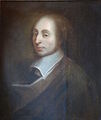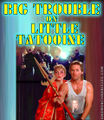Template:Selected anniversaries/January 23: Difference between revisions
No edit summary |
No edit summary |
||
| (52 intermediate revisions by the same user not shown) | |||
| Line 1: | Line 1: | ||
<gallery> | <gallery> | ||
|| *** DONE: Pics *** | |||
File: | ||1549: Johannes Honter dies ... cartographer and theologian. No DOB. Pic: postage stamp. | ||
File:Blaise Pascal.jpg|link=Blaise Pascal (nonfiction)|1656: [[Blaise Pascal (nonfiction)|Blaise Pascal]] publishes the first of his ''Lettres provinciales'', in which he humorously attacks casuistry and accuses Jesuits of moral laxity, his tone combining the fervor of a convert with the wit and polish of a man of the world. | |||
||1719: John Landen born ... mathematician and theorist. Pic search. | |||
||1723: Christian Gottlieb Kratzenstein born ... doctor, physicist, and engineer. From 1753 to the end of his life he was a professor at the University of Copenhagen where he served as rector four times. He is especially known for his investigations of the use of electricity in medicine and the first attempts at mechanical speech synthesis. Pic. | |||
||1734: Wolfgang von Kempelen born ... author and inventor, known for his chess-playing "automaton" hoax The Turk and for his speaking machine. Pic. | |||
||1744: Giambattista Vico dies ... political philosopher and rhetorician, historian and jurist, of the Age of Enlightenment. He criticized the expansion and development of modern rationalism, was an apologist for Classical Antiquity, a precursor of systematic and complex thought, in opposition to Cartesian analysis and other types of reductionism, and was the first expositor of the fundamentals of social science. Pic. | |||
||1785: Matthew Stewart dies ... mathematician and academic. Pic. | |||
||1796: Chemist, botanist, and academic Karl Ernst Claus born. Pic. | |||
||1799: Alois Negrelli born ... engineer and railroad pioneer active in the Austrian Empire. Pic. | |||
File:Claude Chappe.jpg|link=Claude Chappe (nonfiction)|1805: Inventor [[Claude Chappe (nonfiction)|Claude Chappe]] dies. He invented and developed a practical semaphore system that eventually spanned all of France -- the first practical telecommunications system of the industrial age. | |||
||1810: Johann Wilhelm Ritter dies ... chemist and physicist. Pic. | |||
||1840: Ernst Abbe born ... physicist and engineer. Pic. | |||
||1846: Nikolay Umov born ... physicist and mathematician known for discovering the concept of Umov-Poynting vector and Umov effect. Pic. | |||
||1855: John Browning born ... weapons designer, founded the Browning Arms Company. Pic. | |||
||1857: Andrija Mohorovičić born ... meteorologist and seismologist ... known for the eponymous Mohorovičić discontinuity and is considered as one of the founders of modern seismology. Pic. | |||
File:David Hilbert.jpg|link=David Hilbert (nonfiction)|1862: Mathematician [[David Hilbert (nonfiction)|David Hilbert]] born. he will discover and develop a broad range of fundamental ideas in many areas, including invariant theory and the axiomatization of geometry. | File:David Hilbert.jpg|link=David Hilbert (nonfiction)|1862: Mathematician [[David Hilbert (nonfiction)|David Hilbert]] born. he will discover and develop a broad range of fundamental ideas in many areas, including invariant theory and the axiomatization of geometry. | ||
File: | ||1862: Frank Shuman born ... inventor, engineer and solar energy pioneer known for his work on solar engines, especially those that used solar energy to heat water that would produce steam. | ||
||1870: In Montana, U.S. cavalrymen kill 173 Native Americans, mostly women and children, in what becomes known as the Marias Massacre. | |||
||1872: Paul Langevin born ... physicist and academic. Pic. | |||
||1876: Otto Diels born ... chemist and academic, Nobel Prize laureate. Pic. | |||
||1888: Paul Peter Ewald born ... physicist and crystallographer whose theory of X-ray interference by crystals was the first detailed, rigorous theoretical explanation of the diffraction effects first observed in 1912 by his fellow physicist Max von Laue. Pic: https://www.todayinsci.com/8/8_22.htm | |||
||1891: Abram Samoilovitch Besikovitch born ... mathematician. He will work on combinatorial methods and questions in real analysis, such as the Kakeya needle problem and the Hausdorff-Besicovitch dimension. Pic. | |||
File:Oliver Blackburn Shallenberger.jpg|link=Oliver B. Shallenberger (nonfiction)|1898: Electrical engineer and inventor [[Oliver B. Shallenberger (nonfiction)|Oliver Blackburn Shallenberger]] dies. He invented the first successful alternating current electrical meter, which was critical to the general acceptance of AC power. | |||
||1904: Ålesund Fire: the Norwegian coastal town Ålesund is devastated by fire, leaving 10,000 people homeless and one person dead. Kaiser Wilhelm II funds the rebuilding of the town in Jugendstil style. | |||
||1905: Jerrold Reinach Zacharias born ... physicist and Institute Professor at the Massachusetts Institute of Technology, as well as an education reformer. His scientific work was in the area of nuclear physics. Pic. | |||
||1907: Hideki Yukawa born ... physicist and academic, Nobel Prize laureate. Pic. | |||
||1909: RMS ''Republic'', a passenger ship of the White Star Line, becomes the first ship to use the CQD distress signal after colliding with another ship, the SS Florida, off the Massachusetts coastline, an event that kills six people. The Republic sinks the next day. | |||
||1912: The International Opium Convention is signed at The Hague. | |||
||1918: Gertrude B. Elion born ... biochemist and pharmacologist, Nobel Prize laureate. Pic search. | |||
||1919: Hans Hass born ... biologist and underwater diving pioneer. He was known mainly for being among the first scientists to popularise coral reefs, stingrays and sharks. He pioneered the making of documentaries filmed underwater. Pic. | |||
File:Walter Frederick Morrison.jpg|link=Walter Frederick Morrison (nonfiction)|1920: Businessman [[Walter Frederick Morrison (nonfiction)|Walter Frederick Morrison]] born. Morrison will invent the Frisbee. The first version, a cake pan purchased for a nickle and sold for a quarter, will be known as the Flyin' Cake Pan. | |||
||1923: Harold Grad born ... applied mathematician. His work specialized in the application of statistical mechanics to plasma physics and magnetohydrodynamics. Pic. | |||
||1924: Michael James Lighthill born ... applied mathematician, known for his pioneering work in the field of aeroacoustics. Pic. | |||
||1937: The trial of the anti-Soviet Trotskyist center sees seventeen mid-level Communists accused of sympathizing with Leon Trotsky and plotting to overthrow Joseph Stalin's regime. | |||
||1937: Orso Mario Corbino dies ... physicist and politician. Pic. | |||
||1937: Stanton J. Peale born ... astrophysicist and academic. Pic seach. | |||
File:Charles Lindbergh.jpg|link=Charles Lindbergh (nonfiction)|1941: [[Charles Lindbergh (nonfiction)|Charles Lindbergh]] testifies before the U.S. Congress and recommends that the United States negotiate a neutrality pact with Adolf Hitler. | |||
||1946: Boris Berezovsky born ... businessman and mathematician. Pic. | |||
||1957: American inventor Walter Frederick Morrison sells the rights to his flying disc to the Wham-O toy company, which later renames it the "Frisbee". | |||
||1960: The bathyscaphe ''USS Trieste'' breaks a depth record by descending to 10,911 metres (35,797 ft) in the Pacific Ocean. | |||
||1969: Jon Hal Folkman dies ... mathematician, a student of John Milnor, and a researcher at the RAND Corporation. Pic: diagram. | |||
||1971: Fritz Feigl dies ... chemist and academic. Pic search. | |||
|File:Nixon April-29-1974.jpg|1973: United States President Richard Nixon announces that a peace accord has been reached in Vietnam. | |||
File:Big Trouble on Little Tatooine 2.jpg|link=Big Trouble on Little Tatooine|1986: Premiere of '''''[[Big Trouble on Little Tatooine]]''''', a comedy-adventure film starring starring Kurt Russell, and the first major motion picture in the "Big Trouble in the Star Wars Franchise" series. | |||
||1987: Sergei Nikolaevich Chernikov dies ... mathematician who contributed significantly to the development of infinite group theory and linear inequalities. Pic. | |||
||1988: Charles Glen King dies ... biochemist and academic ... vitamin C. Pic. | |||
||1990: Nikolaus Hofreiter dies ... mathematician who worked mainly in number theory. Pic: http://geschichte.univie.ac.at/de/node/33601 | |||
||1991: Herbert Fröhlich dies ... physicist. Fröhlich proposed a theory of coherent excitations in biological systems known as Fröhlich coherence. A system that attains this state of coherence is known as a Fröhlich condensate. Pic. | |||
||1997: Astronomer and academic Roger John Tayler dies. In his scientific work, Professor Tayler made important contributions to stellar structure and evolution, plasma stability, nucleogenesis and cosmology. Pic search. | |||
File:Pioneer 10 construction.jpg|link=Pioneer 10 (nonfiction)|2003: A very weak signal from ''[[Pioneer 10 (nonfiction)|Pioneer 10]]'' is detected for the last time; no usable data can be extracted. | File:Pioneer 10 construction.jpg|link=Pioneer 10 (nonfiction)|2003: A very weak signal from ''[[Pioneer 10 (nonfiction)|Pioneer 10]]'' is detected for the last time; no usable data can be extracted. | ||
File:E. Howard Hunt.jpg|link=E. Howard Hunt (nonfiction)|2007: CIA officer and author [[E. Howard Hunt (nonfiction)|E. Howard Hunt]] dies. | File:E. Howard Hunt.jpg|link=E. Howard Hunt (nonfiction)|2007: CIA officer and author [[E. Howard Hunt (nonfiction)|E. Howard Hunt]] dies. Liddy was implicated in the assassination of John F. Kennedy. Later, along with G. Gordon Liddy, Hunt plotted the [[Watergate scandal (nonfiction)|Watergate burglaries]] and other undercover operations for the Nixon administration. | ||
||2008: Bobby Fischer dies ... chess player and author. Pic. | |||
||2010: Industrial accident: On the afternoon of Saturday, January 23, 2010, Carl “Danny” Fish, a 32-year employee of the DuPont plant in Belle, West Virginia was performing a routine operation when a hose carrying phosgene (a chemical so toxic it was used as a weapon during World War I) ruptured, spraying him in the face and chest. Fish was rushed to the hospital. He died the night of January 24. | |||
|link: http://www.thepumphandle.org/2011/07/13/33-hours-3-toxic-releases-1-fa/#.XLNAvuhKhaQ | |||
|link: https://nsc.nasa.gov/docs/default-source/system-failure-case-studies/sfcs-2015-04-14-deadlyexposure-presentation.pdf?sfvrsn=ad4eecf8_2 | |||
||2016: Dmitry Vasil'evich Shirkov dies ... theoretical physicist, known for his contribution to quantum field theory and to the development of the renormalization group method. Pic. | |||
|| | ||2018: Nicanor Parra dies ... physicist, mathematician, and poet. Parra was a professor of theoretical physics in Santiago, and read his poetry in England, France, Russia, Mexico, Cuba, and the United States; his poetic language renounced the refinement of most Latin American literature and adopted a more colloquial tone. Pic. | ||
</gallery> | </gallery> | ||
Latest revision as of 12:12, 23 January 2022
1656: Blaise Pascal publishes the first of his Lettres provinciales, in which he humorously attacks casuistry and accuses Jesuits of moral laxity, his tone combining the fervor of a convert with the wit and polish of a man of the world.
1805: Inventor Claude Chappe dies. He invented and developed a practical semaphore system that eventually spanned all of France -- the first practical telecommunications system of the industrial age.
1862: Mathematician David Hilbert born. he will discover and develop a broad range of fundamental ideas in many areas, including invariant theory and the axiomatization of geometry.
1898: Electrical engineer and inventor Oliver Blackburn Shallenberger dies. He invented the first successful alternating current electrical meter, which was critical to the general acceptance of AC power.
1920: Businessman Walter Frederick Morrison born. Morrison will invent the Frisbee. The first version, a cake pan purchased for a nickle and sold for a quarter, will be known as the Flyin' Cake Pan.
1941: Charles Lindbergh testifies before the U.S. Congress and recommends that the United States negotiate a neutrality pact with Adolf Hitler.
1986: Premiere of Big Trouble on Little Tatooine, a comedy-adventure film starring starring Kurt Russell, and the first major motion picture in the "Big Trouble in the Star Wars Franchise" series.
2003: A very weak signal from Pioneer 10 is detected for the last time; no usable data can be extracted.
2007: CIA officer and author E. Howard Hunt dies. Liddy was implicated in the assassination of John F. Kennedy. Later, along with G. Gordon Liddy, Hunt plotted the Watergate burglaries and other undercover operations for the Nixon administration.








